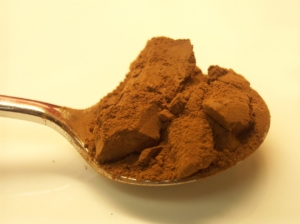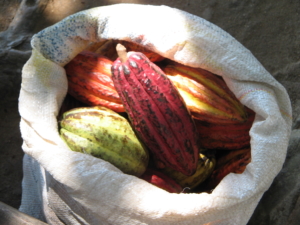
Happy National Cocoa Day!
My first memories of hot cocoa: Coming indoors from an afternoon of sledding, fingers and toes numb, coat and hat covered with snow. Peeling off thick layers of sweaters and a wet jacket. Wrapping my hands around a hot cup of chocolate that seems to have appeared magically on the kitchen table. Ahhhhh …
The hot chocolate of my youth is not the hot cocoa that has survived through the ages, however. A robust, bitter brew, the cocoa drink of old contained no sugar or milk, just the pure, earthy cacao powder that Yucatan civilizations, including the Mayans, first drank in betrothal and marriage rituals—likely cacao’s first association with romance.

Cacao Pods
The Latin word for cocoa—theobroma—means “food of the gods.” (No argument here.) The cacao tree originated in the Americas, especially Central America, Mexico and parts of South America. As long ago as 5,000 years ago, pre-Colombian cultures consumed cacao in spiritual ceremonies. Before the Spaniards conquered Mesoamerica, cacao was used as currency.
It was the Spaniards that introduced cacao to Europe, and later to the rest of the world. By the 17th century, cocoa had become a popular drink throughout Europe.
Today, we love our cocoa. On popularity alone, cacao-based confections have surpassed pretty much all other sweet treats. But chocolate doesn’t have to be a guilty pleasure. As time passes, we’re learning more and more about cocoa’s nutrient-rich profile. Cacao is rich in minerals, including magnesium, calcium, iron, phosphorous, manganese and copper. It is known to have anti-inflammatory and antioxidant qualities. In addition, cocoa contributes fiber and protein to our diets.
If you’ve ever tasted unsweetened cacao powder, you know that it’s very bitter. That is why chocolate confections and the hot chocolate we all know and love are loaded with sugar. If you’re feeling daring today, on National Cocoa Day, you might want to explore some more traditional-style treats, such as these healthy recipes.
